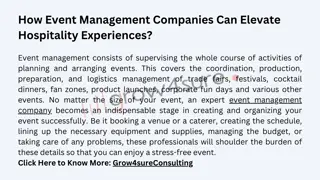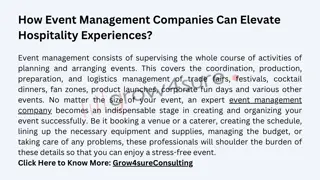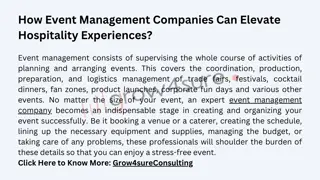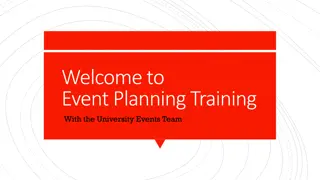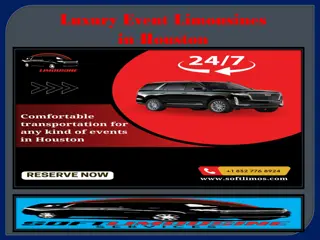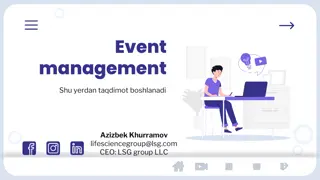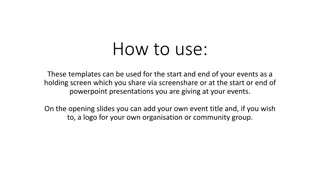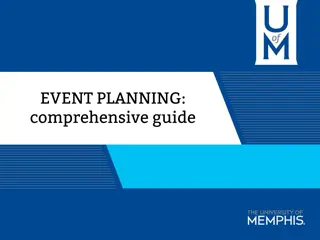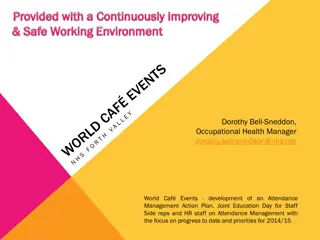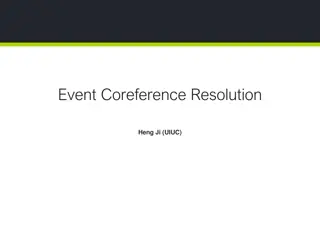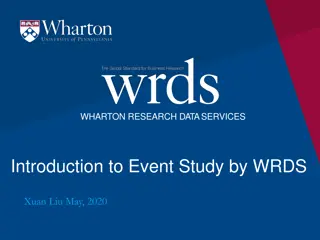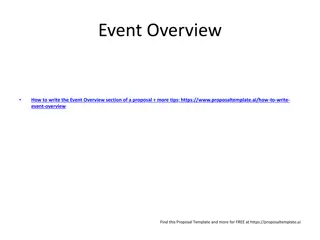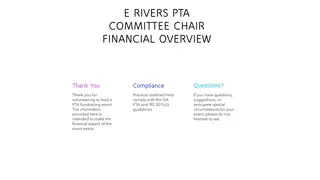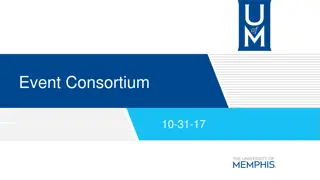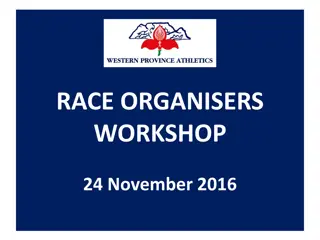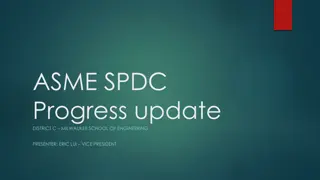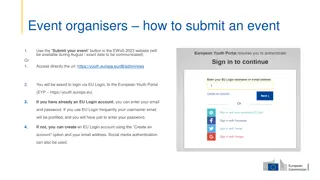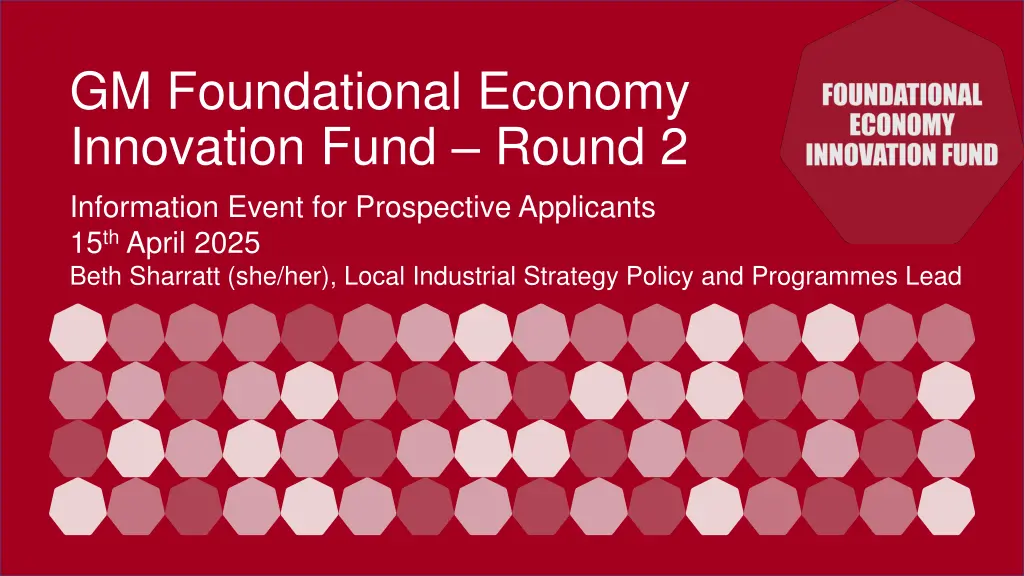
Exploring the Foundational Economy Innovation Fund for Sustainable Growth
Discover the significance of the foundational economy, its sectors, and why supporting it is vital for inclusive economic development. Learn about the Foundational Economy Innovation Fund's objectives and potential impact on essential services. Explore if this opportunity aligns with your project goals and aspirations. The event aims to shed light on how the foundational economy underpins societal well-being. Join us to gain insights, ask questions, and determine if this fund is the right fit for your initiatives.
Download Presentation

Please find below an Image/Link to download the presentation.
The content on the website is provided AS IS for your information and personal use only. It may not be sold, licensed, or shared on other websites without obtaining consent from the author. If you encounter any issues during the download, it is possible that the publisher has removed the file from their server.
You are allowed to download the files provided on this website for personal or commercial use, subject to the condition that they are used lawfully. All files are the property of their respective owners.
The content on the website is provided AS IS for your information and personal use only. It may not be sold, licensed, or shared on other websites without obtaining consent from the author.
E N D
Presentation Transcript
GM Foundational Economy Innovation Fund Round 2 Information Event for Prospective Applicants 15th April 2025 Beth Sharratt (she/her), Local Industrial Strategy Policy and Programmes Lead
Purpose of todays event: To help you to Understand what we mean by the foundational economy , and why we want to support it Provide an overview of the Foundational Economy Innovation Fund and the kind of projects we re looking to fund To help you to decide whether the fund is a good opportunity for you Give you a chance to ask questions Please refer to the quick guide or full guidance for applicants for more detail
What is the the Foundational Economy? The "foundational economy" is a way of conceptualising or grouping a number off sectors of the economy that supply essential goods and services, used by everyone in everyday life It includes a place s key workers, essential supply chains and infrastructure, culturally important goods and services (like hairdressing and beauty) and underpins places, other parts of the economy and well-being. Hospitality, Leisure and Tourism Health and Social Care Early Years and Childcare Education Retail Construction Transport Manufacturing (foundation sectors) Financial, Insurance and Real Estate Services Public Utilities and Infrastructure Agriculture and Fishing Communications Housing Administration
What is the Foundational Economy? The "foundational economy" is a way of conceptualising or grouping a number off sectors of the economy that supply essential goods and services, used by everyone in everyday life It includes a place s key workers, essential supply chains and infrastructure, culturally important goods and services (like hairdressing and beauty) and underpins places, other parts of the economy and well-being. Hospitality, Leisure and Tourism Health and Social Care Early Years and Childcare Education Retail Construction Transport Manufacturing (foundation sectors) Financial, Insurance and Real Estate Services Public Utilities and Infrastructure Agriculture and Fishing Communications Housing Administration
Why a Challenge Fund? We know that the foundational economy an be overlooked by traditional approaches to economic development, which tend to focus on high-growth sectors GM s foundational economy is huge with an estimate 60,000 businesses and employing approximately 42% of the workforce. Addressing the challenges faced by this sector is critical to creating inclusive economic growth Jobs in the foundational economy are likely to be lower paid and less secure that in other parts of the economy and improving pay and conditions in FE sectors is challenging. Some progress is being made via the Real Living Wage Campaign and Good Employment Charter to address these challenges we want to build the capacity of the sector to address challenge such as these in innovative ways The Foundational Economy is also being hit simultaneously by the cost of living and cost of doing business crisis, and the potential for ongoing shocks points to the need for innovation rather than short-term solutions. The Foundational Economy has fewer innovation networks we want to build innovation capacity and a community of innovators to go after bigger investment or opportunities in the future.
Fund Overview Two Stages of Funding Testing Phase This is what we re focusing on today this will see up to 25 projects will receive up to 11,000 to test out innovative ideas Scale up Phase The 25 projects funded as part of the Testing phase will be invited to apply for further funding to scale up their project 15- 20 will receive further funding of up to 60,000
Ineligible Activities Subsidising standard industry training or wellbeing support The purchase of readily available energy efficiency solutions (e.g., solar panels, insulation, or ground source heat pumps) on the marketplace unless it can be justified that the use of this would be innovative or contribute to further development and learning regarding this solution Subsidising business as usual activity including the hiring of new staff to do existing roles or functions to expand the size of an organisation Subsidising consumer prices or providing vouchers Upgrading, expanding, or adding new physical structures to your premises, or purchasing a new premises, unless this activity is one aspect of an innovation to address one of the challenges Advertising or the promotion of existing products and services Providing bonuses, finical incentives or sponsorship monies for staff Projects that were funded through Round 1 of the Fund (unless proposing a new innovation that builds on your learning) Upgrading tills, EOPS systems, booking systems or other business ICT which is already commonly used in the sector
Eligibility The fund is open to Private, Voluntary, Community, Faith and Social Enterprise (VCFSE) and Public sector organisations, as long as the proposed projects are based in Greater Manchester Eligible Sectors you must be working in or proposing to support one or more of these sectors: Health & Social Care Early Years and Childcare 0-5 years The Local High Street (retail, hospitality, leisure, tourism, personal services, culture) Your proposed project must address one or more of the challenge areas or sector-specific challenges
Challenge Areas (1/2) Same as 1st Round Supporting the Workforce - Innovations that help with developing, recruiting and retaining staff. This could include new ways of upskilling the workforce, improving progression routes or providing greater flexibility of working patterns and security of hours worked. This could also include finding new ways to connect employers and potential employees, including the self-employed and those who have struggled to find stable work, particularly individuals experiencing inequalities. This does not include using funds to subsidise staff to conduct business as usual activity, the use of monetary incentives, or the purchasing of wellbeing services. More Effective Services and Products - Innovations that help create or integrate new ways of delivering your current services or products to a higher standard by doing things more efficiently and effectively. This could include re-thinking your approach to resourcing, organising work, and the adoption or development of technology. This is not about expanding or fundamentally changing the services or products you provide, but instead doing what you do already, better. Localising Supply Chains, Low Carbon and Net Zero - Innovations that support local, sustainable, and circular supply chains. Circular supply chains being those that share, lease, reuse, repair, refurbish, and recycle existing materials and products for as long as possible within Greater Manchester. Innovations that reduce or manage energy consumption and carbon emissions, including via the development and testing of new technology, as well as new systems and initiatives to use and share resources more efficiently or reduce the use of resources.
Challenge Areas (2/2) New for Round 2 Sector-Specific Challenges The specific challenges for the Health and Social Care sector are: Innovations that could support the role of technology and digital solutions in enabling care, including supporting people through the utilisation of technology Innovations that could keep people well in the community - reducing demand on primary, secondary and specialist care The specific challenges for the Early Education and Childcare sector are: Innovations that could increase the supply of early education places in areas where a need has been identified Innovations that could contribute to developing the pipeline of level 3 qualified staff in the early education and childcare workforce The specific challenges for The Local High Street sector are: Innovations that could increase recycling rates in food-based hospitality Innovations that could improve capacity for financial management Innovations that could support better utilisation of underused buildings or facilities
Identifying your challenge area When applying, you should identify the challenge area or sector-specific challenge that your project primarily aims to address. Here are a couple of examples: Scenario 1: You run an upcycling business, refurbishing and selling furniture, and you want to innovate your recruitment to build a pathway for disabled people to join your workforce. Your sector is the Local High Street Your challenge area is Supporting the Workforce Scenario 2: You are a tech company with an idea for a digital product that would enable health and social care providers to support their clients within their home Your sector is Health and Social Care Your sector-specific challenge is Innovations that could support the role of technology and digital solutions in enabling care, including supporting people through the utilisation of technology
Round 1- Highlights (1/2) Manchester Modernist Society New Tours app supported by FEIF covered by the Guardian Cabasa s network of volunteer growers produced non-synthetic fabric dyes for groundbreaking Living Dress installations Green Street Pioneers has launched Borro - a reusable cup scheme in the Northern Quarter and Ancoats areas of Manchester reducing waste and saving hospitality businesses money on single use items Launch of JiFFL a platform specifically designed for the part-time and flexible job market
Round 1- Highlights (continued) The Foundational Economy Innovation Fund was nominated for the Most Innovative Project at the Institute for Economic Development Awards 2024 Business Insider published their piece Boosting the Foundational Economy in March 2025 Business Insider held a Roundtable event with projects from Round 1 who had been successful in securing Scale Up funding
More than a fund Alongside funding projects will take part in: A network that will connect you with other funded projects (including those funded during Round 1) and other stakeholders interesting in supporting the foundational economy Tailored Business Support to help develop your project this could include things such as specialist advice on commercialising your innovation A Research and Evaluation Programme that will build an evidence base in what works in supporting the foundational economy
Application Checklist Before submitting be sure to check you can answer yes to the following questions The proposed project: If you are relying on a particular partner to deliver your project, you have secured their agreement in principle before applying Is innovative Is deliverable within the proposed funding (up to 11,000) and timescale (Approx July 2025 March 2026) Also that you have read the guidance for applicants document in full Impacts on one of the eligible sectors Addresses on of the challenges (either one of the main 3 challenge areas or one of the sector-specific challenges) Would generate impact within Greater Manchester Doesn t include any ineligible activity
Finally - Remember these tips Read the guidance document Don t try and shoehorn in an idea that doesn t fit! Make the most of the word count to tell us about your idea (not general info about your business/organisation) and how you would deliver your project Avoid jargon Be clear about how your project is innovative and different from your business as usual Write down your answers on a separate document before copying and pasting into the Microsoft form If you have any questions after today that aren t answered by reading the guidance document, please email gmcaeconomy@greatermanchester-ca.gov.uk Don t leave applying to the last minute! The form will close at 23.59 on Tuesday 13th May

